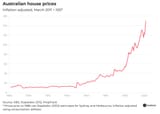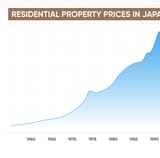>>60603357 (OP)>>60603363>>60603383>>60603497>>60603841It's pretty simple to understand, anons. Most people want/need to live where jobs are. In places like Australia and Canada very little of the land is actually developed/habitable and so there are very few areas where jobs can be.
Populations tend to grow somewhat exponentially over time. You have 2 children, they have 2 children (so what was 2 is now 4), they have 2 (8), etc. More people = more demand for housing, but people still don't want to live too far from where they work so this is why cities start to develop UP once they get large enough (apartment buildings vs. houses, then 10-20 story buildings vs. 3-5 story buildings, then skyscrapers, etc.).
Houses ultimately become very valuable because often on the property of one single home you can build minimally one apartment building and now sell 5-10+ units vs. selling one. It's the land that is increasing in value, not the home itself.
This is also true in the USA, and EVERY country, though these things will be felt/perceived at different levels due to (1) amount of habitable land and (2) rate of population growth.
Increasing desirable land amounts is unlikely. Cities grow near ports and places of transport and convergence. The ones that are going to exist all already do. You can put plumbing in rural Alabama all day but jobs won't develop there, and houses will remain low value, so builders won't build there because there's no money to be made.
The only thing that will bring home prices down would be population decrease. Good luck with that, humans like to fuck and despise condoms.
On top of all this, builders can not keep up with demand. There are housing shortages in every desirable country right now.
This is why, no memes, housing prices always go up and always will. It's a side effect of population growth x low amount of desirable land & all desirable land discovered/already "maxed" out.


